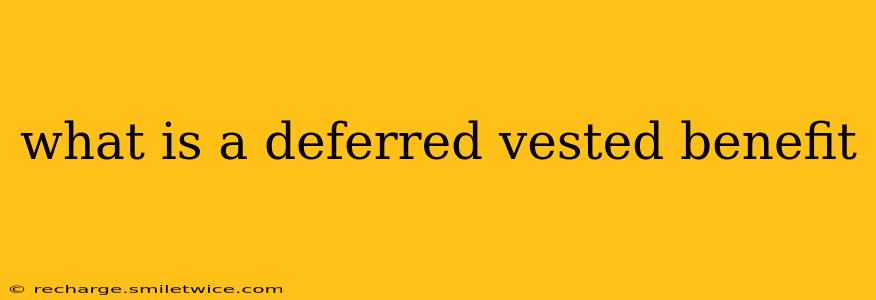A deferred vested benefit refers to a retirement plan benefit that you've earned (vested) but won't receive until a later date, typically retirement. The term combines two key concepts: vesting and deferral. Let's break them down:
-
Vesting: This means you have earned a non-forfeitable right to a portion or all of your retirement plan benefits. Even if you leave your employer before retirement, you are still entitled to the vested portion. Vesting schedules vary depending on the plan, with some offering immediate vesting and others having gradual vesting periods (e.g., 20% vested after two years, 100% vested after five).
-
Deferral: This signifies that the payment of your vested benefit is delayed until a future date, usually retirement age. The money remains invested within the retirement plan, growing tax-deferred until distribution.
Therefore, a deferred vested benefit is your guaranteed share of the retirement plan's assets that you’ve earned and are secured, but are not yet available for withdrawal. You've fulfilled the requirements to own this portion of the plan, but it remains within the plan until you choose to access it.
How Does a Deferred Vested Benefit Work?
Imagine you participate in a 401(k) plan at your company. You contribute a portion of your salary, and your employer may also contribute matching funds. Over time, your account grows through investment returns. As you meet your plan's vesting schedule, a larger portion of these assets becomes yours to keep. However, even if fully vested, you cannot withdraw this money until retirement or a qualified event (e.g., hardship withdrawal, which often has restrictions). This is your deferred vested benefit.
The actual value of your deferred vested benefit will fluctuate based on the performance of the underlying investments within the plan. You typically have choices in how your money is invested (e.g., stocks, bonds, mutual funds), and the investment performance will influence the eventual amount you receive at retirement.
What Happens if I Leave My Employer Before Retirement?
If you leave your employer before retirement, your vested benefits remain in the plan. Depending on your plan's rules, you may have several options:
- Leave the money in the plan: Your account continues to grow tax-deferred until retirement.
- Roll over the funds: You may be able to roll over your vested benefits into an IRA or another eligible retirement plan, preserving the tax-deferred status.
- Cash out: In some cases, you may be able to cash out your vested benefits, but this is often not recommended due to potential tax penalties and the loss of future investment growth.
What are the Tax Implications?
The tax implications of a deferred vested benefit depend heavily on several factors, including:
- The type of retirement plan: Different plans have different tax rules.
- Your age at distribution: Withdrawals before age 59 1/2 generally incur a 10% early withdrawal penalty, along with regular income tax.
- The type of distribution: A lump-sum withdrawal will be taxed differently than a series of regular payments.
It's essential to consult a qualified financial advisor or tax professional to understand the tax implications related to your specific situation.
How is a Deferred Vested Benefit Different from a Non-Vested Benefit?
The critical difference lies in ownership. A deferred vested benefit is yours, regardless of your employment status. A non-vested benefit, conversely, is not yet yours. If you leave your employer before fulfilling the vesting requirements, you forfeit any non-vested portion of your retirement plan contributions and employer matching contributions.
What Happens to My Deferred Vested Benefit if the Company Goes Bankrupt?
The security of your deferred vested benefit in the event of a company bankruptcy depends on the type of plan. Generally, plans like 401(k)s offer stronger protection than traditional pension plans since assets are held in a trust separate from the company's general assets. However, the specifics are complex and depend on the plan's structure and the bankruptcy laws. It's crucial to understand the specific protections offered by your particular plan.
Understanding deferred vested benefits is crucial for maximizing your retirement savings and planning for your financial future. Always review your plan's documentation carefully, and don't hesitate to seek professional advice for personalized guidance.
